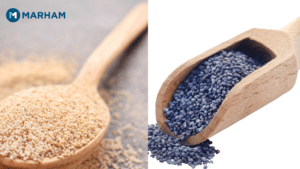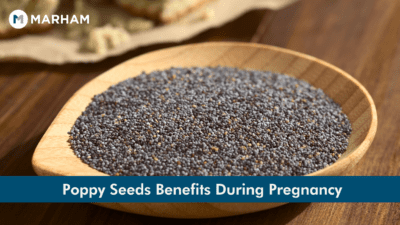Khashkhash are small kidney-shaped seeds extracted from the poppy plant. They come in different colors, ranging from blue, gray, black, or white. They are known by various names around the world. Other names of khashkhash are khus khus, kasakasa, etc.
They are widely and easily available and can be brought from any grocery store. They have a nutty flavor and are commonly used to enhance the texture, flavor, and aroma of cookies, breads, curries, cakes, pancakes, salads, waffles, pastries, etc.
Apart from just giving flavor and texture to the food, they also provide benefits to males and females equally.
Before getting into the poppy seeds benefits during pregnancy, let’s know the meaning of khashkhash in English, the types of khashkhash, and its nutritional value.
Khashkhash in English
The meaning of khashkhash in English is Poppy seeds. These seeds get their name from the poppy plant from which they are derived.
Apart from poppy seeds, they are known by many other names in the different regions of the world, including Pakistan, India, etc.
Types of Khashkhash
There are different types of poppy seeds used all around the world. The most common types of khashkhash are as follows:
- White Poppy Seeds – They are white in color and are also known as Asian or Indian Poppy seeds.
- Blue Poppy Seeds – They are blue in color and also known as European Poppy seeds.
- Oriental Poppy Seeds – They are also black or blue in color and also known as Opium Poppy seeds.


Nutritional Value of Khashkhash
Khashkhash is an excellent source of dietary fiber. This aids in keeping you feeling full for longer periods. It also has magnesium which is beneficial for good bone health and blood clotting.
100 g of Khashkhash holds the following nutritional value:
| Khashkhash Contents (per 100g) | Amount |
| Calories | 525 |
| Carbohydrates | 28.13g |
| Fibre | 19.5g |
| Fats | 41.56g |
| Protein | 21.22g |
| Thiamine | 74% of the daily value (DV) |
| Folate | 21% of the DV |
| Vitamin B6 | 19% of the DV |
| Vitamin E | 12% of the DV |
| Choline | 11% of the DV |
| Riboflavin | 8% of the DV |
| Calcium | 144% of the DV |
| Phosphorus | 124% of the DV |
| Manganese | 109% of the DV |
| Magnesium | 98% of the DV |
| Iron | 75% of the DV |
8 Poppy Seeds Benefits During Pregnancy
Some of the poppy seed benefits during pregnancy and in women’s fertility are as follows:
1. Improves Female Fertility
Khashkhash (poppy seeds) and poppy seed oil benefits for improving female fertility are incredible.
A blocked fallopian tube prevents the fertilized egg from attaching to the uterine wall. Flushing the fallopian tube with poppy seed oil dissolves any mucus particles or debris from the fallopian tube. It helps to open the blockage. This improves fertility and increases the fertility chances.
Many researchers have reported that poppy seeds have lignin which has an aphrodisiac effect that improves sexual health and increases libido (sex drive).
If you have any fertility issues, then you can consult the best gynecologist in Pakistan via Marham.
2. Energy Source
During pregnancy, a woman needs energy to get up and perform daily tasks. Moreover, the baby also needs energy from the body of the mother.
Therefore, to ensure optimum energy during pregnancy, one should consume poppy seeds. They have high amounts of Vitamin B, including Folic, Pantothenic, and Niacin. They are an excellent source of energy during pregnancy.
RELATED: 10 Effective Khashkhash Benefits That You Should Know
3. High Calcium and Magnesium Levels
Khashkhash seeds are enriched with calcium and magnesium both of which are needed in huge amounts during pregnancy.
During the second trimester of pregnancy, the skeleton and tooth enamel of the baby form, and calcium and magnesium are needed for that in large amounts. The baby fulfills all its needs from the mother for a healthy skeleton. Therefore, the mother needs to take magnesium and calcium in adequate amounts.
Moreover, magnesium and calcium also aid in addressing pregnancy leg cramps. They help in getting a better night’s sleep.
Thus, pregnant women should take poppy seeds in their pregnancy period to have these essential nutrients.
4. Prevent Constipation and Digestive Issues
Khashkhash (poppy seed husks) are high in fiber. Dietary fiber is beneficial for internal organ and bowel cleansing.
Fiber also helps in improving bowel movements and preventing constipation.
During pregnancy, many women face the issue of constipation and other digestive issues. Hence, to treat constipation healthily and naturally, pregnant women should take poppy seeds.
5. Prevent Heart Disease
Khashkhash (poppy seeds) are an excellent source of unsaturated fatty acids. They have a high content of oleic and linoleic acids. They decrease LDL (bad cholesterol) levels and increase HDL (good cholesterol) levels. Thus, they help in preventing the risk of heart disease.
6. Prevent Iron Deficiency
Iron is the most important element during pregnancy to prevent iron deficiency anemia. It also supports the increase in blood volume.
Poppy seeds have iron which can prevent iron deficiency in pregnant women. Although the non-heme iron (found in plant-based foods) absorption is less efficient than heme iron (present in animal products), still the iron present in poppy seeds is helpful.
7. Improved Blood Flow
Poppy seeds are very beneficial for providing a strong blood flow in the body. The active blood flow in the whole body helps in keeping you active and the growth of your baby in check.
8. Promotes Fetal Development
Poppy seeds are enriched with Omega-3 fatty acids. Omega-3 fatty acids are beneficial for the brain and eye development of the fetus.
Although, the amount of omega-3 fatty acids in poppy seeds is low in comparison to other sources such as fatty fish. But still, the consumption of poppy seeds during pregnancy can help in fetal eye and brain development.
Is It Healthy to Consume Poppy Seeds During Pregnancy?
Poppy seeds are washed and processed before using them in various foods and then as a part of any food, they are not known to be a risk during breastfeeding or pregnancy.
However, the outer surface of the poppy seeds (khashkhash) has a small amount of morphine and other opiates like codeine. These elements can affect the growth and development of the baby in pregnant women. Additionally, codeine consumption during the second or third trimester can pose adverse effects on the respiratory system of the unborn baby.
Thus, poppy seeds can be consumed during pregnancy without their outer covering.
Moreover, when poppy seeds are used to make poppy seed tea, these drugs can seep into the water during soaking. Hence, poppy seed tea should be avoided during pregnancy and breastfeeding due to this reason.
Risks of Consuming Poppy Seeds During Pregnancy
Other than the poppy seeds benefits during pregnancy, they also have some side effects during pregnancy. Some of them are as follows:
- The codeine in the outer covering of poppy seeds can cause breathing disorders in the baby during the second or third trimester.
- Poppy seeds have opiates and narcotic codeine. Pregnant women should avoid opiates and codeine as they might cause complications.
- The outer covering of poppy seeds (khas khas) also has a high amount of morphine or toxins. They can risk the health of both the mother and the baby during pregnancy.
Due to the above possible side effects, pregnant women should consume poppy seeds without their outer covering and in moderation.
Foods That Might Have Poppy Seeds
Poppy seeds are enormously used in baked products and other meals available in the market. They are also found in salads and various desserts made all around the world.
Some of the foods that might contain poppy seeds are as follows:
- Salads (dressings)
- Poppy seed pretzels
- Granola
- Bagels
- Cake
- Muffins
- Loaves of bread
- Rolls
- Citrus poppy seed cake
- Vegetable dressings
- Poppy seed pies
- Trail mix used to make Babka (a classic Jewish delicacy)
- Desserts prepared with poppy seed filling
- Poppy seed tea
Final Words
Poppy seeds are known by Khashkhash, khas khas, khus khus, and many other names around the world. They are not only beneficial in normal use but also poppy seeds benefits during pregnancy are innumerable.
From providing calcium and magnesium to preventing iron deficiency, poppy seeds benefits during pregnancy are various and remarkable.
The outer covering of poppy seeds has morphine, opiates, codeine, etc which can cause certain complications during pregnancy.
Moreover, you should consult the best nutritionist in Pakistan via Marham before using poppy seeds during pregnancy to avoid any complications.
Frequently Asked Questions (FAQs)
1. Are poppy seeds OK for pregnancy?
Poppy seeds are washed and processed before using them in various foods and then as a part of any food, they are not known to be a risk during breastfeeding or pregnancy. However, they should always be consumed without their outer covering as it has morphine, opiates, codeine, etc which can cause certain complications during pregnancy.
2. Which spices should be avoided during pregnancy?
One should avoid the following during pregnancy:
- Coriander
- Garlic
- Sesame
- Fenugreek
- Peppermint
- Asafoetida or Hing

